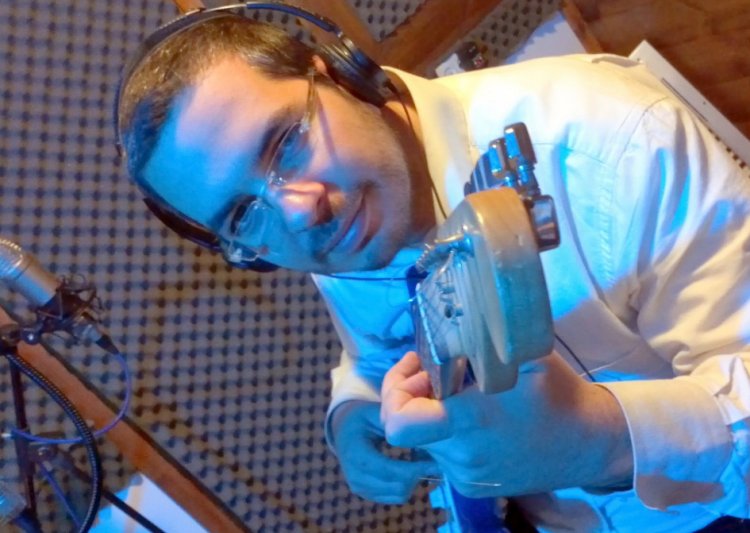"I Was Disappointed by Rabbi Kanievsky's Blessing, Then Suddenly Felt a Strong Pat on the Back"
Musician Liran Elkobi started exploring Judaism at just 17 and a half due to a question from a religious man. Now he is married and a father of five. An exclusive interview.

I conduct the phone interview with Liran Elkobi late at night, while he's on the road. These are the best hours to talk to Elkobi, as his day is packed with activities: he wakes up in the morning for Shacharit prayer and learns with his chavrusa until 9:00. After that, he goes down to his private studio beneath his home and starts working. At 13:00, he prays Mincha, and he dedicates his afternoons to his job as an instructor at a special education hostel in Rekhasim. In the evening, he prays Maariv, and then plunges into more work in the studio till the wee hours of the night.
Liran Elkobi (34) grew up in Rekhasim when it was still predominantly secular, and he studied in secular frameworks. "I was a good kid but mischievous," he recalls, "the one who makes everyone laugh, the class clown."
His journey towards Judaism began when he was 17 and a half, when a religious man approached him and asked if he knew why he fasted on Yom Kippur. "The truth is, I didn't exactly know why, and I answered something like: 'It atones, doesn't it?' He replied: 'It elevates, but what does it help if you then return to the same deeds?' I answered him: 'And do you think I'll ever look like you – dressed in black, tzitzits and a beard?' And then he offered me to take on an easy mitzvah - praying on Friday night at the synagogue. I was convinced, as it took a relatively short time."
I decided to try and see what prayer is, and when I went, it was very nice. I loved being greeted with a hello, after being accustomed in secular society to needing to know someone for at least half an hour or more before anyone says hello. I would come every Friday evening, pray, and leave. After some time, I discovered a new invention - morning prayer on Shabbat. I decided to try that too, and thus a period passed where I prayed but continued to violate Shabbat, until I decided to fully observe Shabbat."
What made you transition from a non-committal status of praying on Shabbat to full observance of mitzvot?
"The Charedim, who until then seemed to me through the press as strange people swaying - simply surprised me. I discovered they talk, and they are people with feelings, manners, and respect. Today there is some openness between secular and Charedim, which wasn't there at that time. I would sit with them, inquire, ask questions, and take an interest."
After some time, Liran thought it might be better to advance and also observe holidays. While the thought was still just an idea, he had a performance scheduled at one of the clubs. It was Shavuot, and the band members came prepared and equipped for the performance. But to their astonishment, the club was closed. It turned out the performance was supposed to take place in two days, on Friday night. "Here I could not take it anymore. I was very angry that because of them I had to violate the holiday. I looked completely secular, and my friend didn't understand at all why I was upset about violating a holiday. I officially announced to him that I'm canceling the performance that is supposed to be in two days and that I don't perform on Shabbat! The funniest and saddest part was that his wife didn't understand what the problem was", he remembers, "She suggested I perform on Shabbat and give the money to the rabbi on Sunday as charity. We returned home, and I immediately went into the synagogue for Shavuot night study. From that stage, they assigned me a rabbi who taught me halachot."
Liran took a little time to learn all the basic halachot, and sometimes made innocent mistakes of the kind Hashem loves most from those new to repentance. "We learned about the laws of ma'aser (tithing), and I thought throwing things in the trash was a waste. And so I acted, where everything my parents bought - I would take a piece and throw it in the trash without even saying the blessings for tithes. Then we learned the laws of borer (sorting). At 18 and a half, when I moved to Ohr Somayach Yeshiva in Jerusalem, I wanted them to think someone serious had arrived at the Yeshiva, and one day, in the middle of a central meal in the dining room, when everyone was listening, I called out to a friend, I think I did borer! I saw many astonished looks and realized I said something wrong. The friend ran to me and explained where I made a mistake; only then did I understand that the laws of borer apply only to Shabbat. Some time ago I was at a wedding and someone came up to me and asked, 'How's it going, borer?' turns out I'm not the only one who remembers that incident," Liran laughs.

How did those around you react to the change that occurred in you?
"My parents opposed it vehemently. My mother told me I'm a good person and not a criminal, so I don't need to become observant. There was a lot of drama at home. My mother wasn't feeling well, and I was very afraid something might happen, G-d forbid, seemingly because of me."
When the time came to get married, I was pretty worried. My mother was depressed about the situation. They took me to Rabbi Kanievsky. I wanted him to assure me nothing would happen, and I wasn't ready to settle for just a blessing. Nevertheless, he blessed me with 'blessing and success, good tidings'. I waited to hear more, and when I realized he wouldn't say anything else - I had a hard look of disappointment."
On my way out, when I was already at the door, I suddenly felt a strong pat on my back. I turned around to see who hit me, and I saw the rabbi still sitting on the chair with an angelic smile on his face. He gestured for me to come closer, and then said: 'Not only will nothing happen - they will still derive much pleasure from you'. To this day, I don't know how I received that pat on the back and who is responsible for it."
How is the relationship with your parents today?
"Today we have an excellent relationship, and everything is fine, thank G-d. We have five wonderful and special children, Baruch Hashem, aged 6 to 13."
Today Elkobi serves as an esteemed musician and producer. He studied piano from a young age and music studies at the conservatory. Later he studied mixing and mastering, and today he arranges, writes, and composes in his private studio, and also serves as a music teacher. "But first of all, Baruch Hashem, I set fixed times for Torah study," he emphasizes.
"I thank Hashem for enabling me to reach this point," concludes Liran, "and may He continue to bestow His abundant goodness upon me, in the hope that we all unite and love, because through love without reason, the righteous redeemer will come and redeem us quickly, amen."

